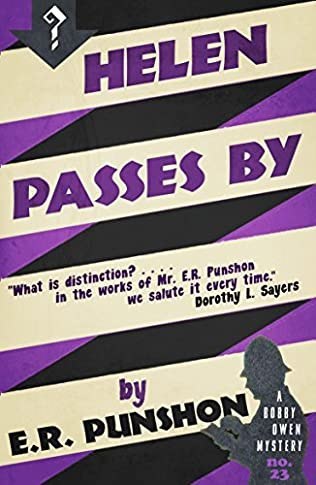Helen Passes By

A review of E R Punshon’s Helen Passes By
This is the twenty-third book in Ernest Punshon’s Bobby Owen series, originally published in 1947 and reissued for a modern readership to discover by Dean Street Press. I am a fan of the series, but this was a strange affair. It started off at pace and was bright and breezy in style but soon got bogged down as a result of its rambling and over-complicated plot. It managed to get back on track as it approached its denouement which was as dramatic as it was tragic.
The eponymous Helen is the daughter of Lord Adour, a narcissistic woman who is in love with her own beauty and who has an unerring knack of making men swoon on seeing her. It this power and magnetism that is at the centre of the case, although Owen never gets to see her to test whether he was impervious to her charms.
Counterbalancing this 20th century Helen of Troy is Alexander Wayling, described as “ugly” but who has a charming way that works well with the women and a happy of knack of touching everyone he meets for a few shillings or a few pounds. He manages to relieve Owen of five shillings and Olive of a fiver. The paths of Helen and Wayling become entwined with tragic consequences for at least one of the two.
One of Wayling’s more endearing characteristics is that he is a fount of all knowledge. At the start of the book, he tells Owen that he is to be seconded back to Scotland Yard to head up a politically sensitive case involving the murder of Itter Bains, found shot in the woods, which has been badly handled by the local Deputy Chief Constable, Seers, and which is attracting considerable interest in the left-wing press because of the potential involvement of a prominent peer, Lord Adour, Helen’s father.
And so it comes to pass. Steer has made a pig’s ear of the investigation, mainly because he too is besotted by Helen and cannot conceive of the idea that a noble peer of the realm or his family could be involved in anything as unseemly as a common or garden murder. Owen is the manifestation of Punshon’s egalitarian Weltanschauung, and not only does he believe that such sentiments are nonsense, but he will also treat everyone on their merits. And so he does.
Steer’s preconceptions and bungling of the case means that there is precious little in the way of physical evidence for Owen to work on. It becomes more of a psychological investigation as he strives to understand each character’s motivation and the reasons for their often strange and incomprehensible behaviour. There are many red herrings and oddities including a Frenchman who suddenly appears and then disappears, a motor launch that suddenly vanishes, a well-informed journalist lurking around, the ever-present Wayling and a midnight assault.
One almost irrelevant episode, the boarding house run by Mrs Mack where those who have run the course of their life quickly exit and young women make short sojourns, which whilst answering why the journo Harry Haile is in the area, raises more questions than it answers. Whilst Owen clearly disapproves of the practices of euthanasia and abortion, both illegal at the time that the book is set, which Mrs Mack freely admits are practised there, would a serving policeman turn a blind to it, whether it was within his jurisdiction or not?
As Owen is staying away from home, Punshon finishes several chapters with extracts from the letters Owen writes to his wife, Olive. This allows Punshon to explain Owen’s thought processes at different stages of the investigation and is quite an effective device, even though Punshon resists the temptation to use it to give us some insights into their relationship.
It would not be a Punshon story without a couple of set pieces. They are effective and dramatic, but Punshon’s writing changes from an easily flowing, almost conversational, style to an overly wrought, almost stilted narrative. The disruption to the flow I this book is quite noticeable.
Although this is not one of Punshon’s best, a moderate to good Bobby Owen story has enough in it to keep the reader interested and the ending is well worth persevering for.



